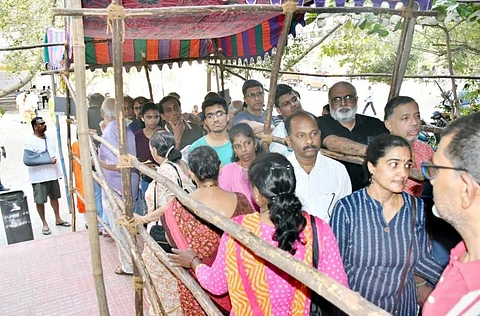

Activists and residents in the southern part of Tamil Nadu, site of the Thoothukudi massacre six years ago, are confident that the incumbent Dravida Munnetra Kazhagam (DMK) will gain in the ongoing Lok Sabha polls due to its steadfast stance on the issue.
Environmental activist Poovulagu Sundar told Down To Earth (DTE) that the Sterlite controversy, which led to the massacre, had a significant impact on the Thoothukudi constituency. Sundar predicted gains for the DMK given that it did not flip-flop on the controversy.
Merina Prabhu, a 42-year-old resident associated with the Federation of People’s Movement against Sterlite, vividly recalled the Thoothukudi massacre.
Reflecting on the past and present elections, Prabhu asserted that the closure of the plant was a major electoral issue in the previous Lok Sabha election and has remained influential till the present day.
With the DMK fulfilling its promise to shut down the plant, Prabhu anticipated a positive electoral outcome, reflecting public satisfaction with the closure.
All 39 districts of Tamil Nadu voted in the first phase of polling in the 2024 Lok Sabha elections on April 19.
Thoothukudi, formerly Tuticorin, is situated on the coast of southern Tamil Nadu. Known as the ‘Pearl City’, Thoothukudi boasts numerous industries, with fishing and manufacturing units being prominent, alongside the V.O. Chidambaranar Port.
Before delimitation, the Thoothukudi constituency sprawled across four districts, encompassing six Assembly segments: Thoothukudi, Tiruchendur, Srivaikuntam, Ottapidaram, Vilathikulam, and Kovilpatti.
In 2018, following extensive protests by locals, social activists, and environmentalists, the Tamil Nadu Pollution Control Board (TNPCB) ordered the closure of the contentious Sterlite copper smelter plant, owned by Vedanta Ltd.
The decision came in the wake of the Thoothukudi massacre on May 22, 2018, where police opened fire on demonstrators opposing the plant’s operations. The protests stemmed from grave concerns regarding environmental degradation and health hazards attributed to the plant’s activities. The firing claimed the lives of 13 protestors.
More recently, on February 29 of this year, the Supreme Court dismissed Vedanta’s special leave petition seeking to reopen the Thoothukudi Sterlite copper plant. This ruling marks a significant victory for Tamil Nadu, affirming the Madras High Court’s judgment from August 2020, which upheld the state government and TNPCB’s decision to permanently shut down the plant due to environmental violations.
The apex court acknowledged the plant’s contributions to production and employment while underscoring the high court’s adherence to essential principles of sustainable development, the polluter pays principle, and the public health doctrine.
It emphasised the paramount importance of safeguarding the health of the local populace, citing repeated breaches by the plant, including the indiscriminate dumping of copper slag in 11 sites, failure to obtain authorisation for hazardous waste disposal, and lapses on the part of the TNPCB in discharging its regulatory duties.